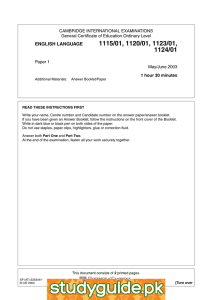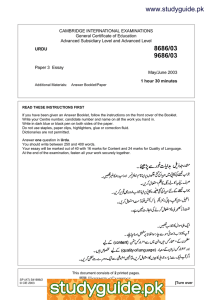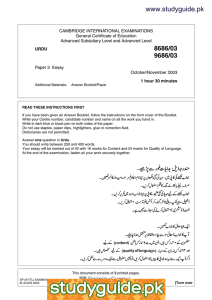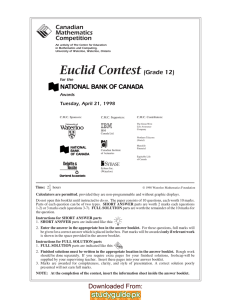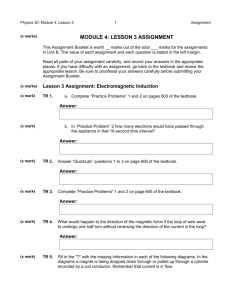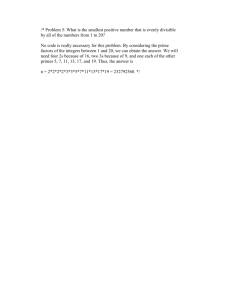Canadian Mathematics Competition
advertisement
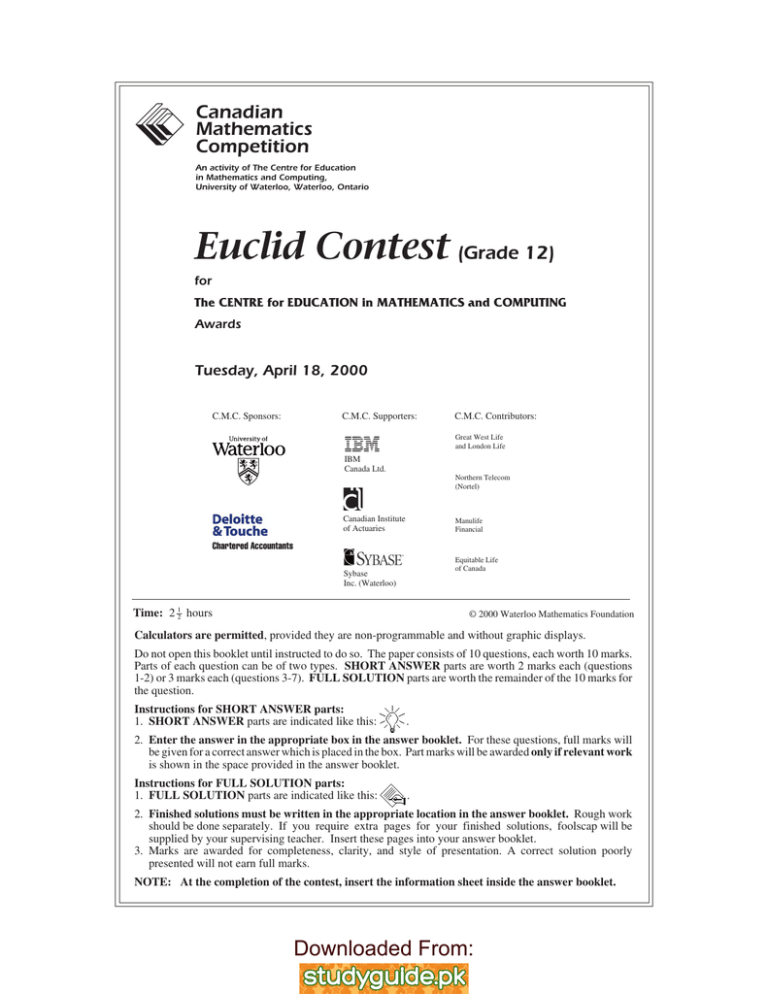
Canadian Mathematics Competition An activity of The Centre for Education in Mathematics and Computing, University of Waterloo, Waterloo, Ontario Euclid Contest (Grade 12) for The CENTRE for EDUCATION in MATHEMATICS and COMPUTING Awards Tuesday, April 18, 2000 C.M.C. Sponsors: C.M.C. Supporters: C.M.C. Contributors: Great West Life and London Life IBM Canada Ltd. Northern Telecom (Nortel) Canadian Institute of Actuaries Manulife Financial Chartered Accountants Equitable Life of Canada Sybase Inc. (Waterloo) Time: 2 12 hours © 2000 Waterloo Mathematics Foundation Calculators are permitted, provided they are non-programmable and without graphic displays. Do not open this booklet until instructed to do so. The paper consists of 10 questions, each worth 10 marks. Parts of each question can be of two types. SHORT ANSWER parts are worth 2 marks each (questions 1-2) or 3 marks each (questions 3-7). FULL SOLUTION parts are worth the remainder of the 10 marks for the question. Instructions for SHORT ANSWER parts: 1. SHORT ANSWER parts are indicated like this: . 2. Enter the answer in the appropriate box in the answer booklet. For these questions, full marks will be given for a correct answer which is placed in the box. Part marks will be awarded only if relevant work is shown in the space provided in the answer booklet. Instructions for FULL SOLUTION parts: 1. FULL SOLUTION parts are indicated like this: . 2. Finished solutions must be written in the appropriate location in the answer booklet. Rough work should be done separately. If you require extra pages for your finished solutions, foolscap will be supplied by your supervising teacher. Insert these pages into your answer booklet. 3. Marks are awarded for completeness, clarity, and style of presentation. A correct solution poorly presented will not earn full marks. NOTE: At the completion of the contest, insert the information sheet inside the answer booklet. Downloaded From: NOTE: 1. 2. Please read the instructions on the front cover of this booklet. Place all answers in the answer booklet provided. 3. For questions marked “ 4. placed in the appropriate box in the answer booklet. Part marks will be given for work shown. Students are strongly encouraged to show their work. It is expected that all calculations and answers will be expressed as exact numbers such as ”, full marks will be given for a correct answer which is to be 4π, 2 + 7 , etc., except where otherwise indicated. 1. 1 3 1 3 (a) If x + 27 = 125 , what is the value of x? (b) The line y = ax + c is parallel to the line y = 2 x and passes through the point (1, 5) . What is the value of c? (c) The parabola with equation y y = ( x – 2) – 16 has its vertex at A and intersects the x-axis at B, as shown. Determine the equation for the line passing through A and B. 2 O B x A 2. (a) Six identical pieces are cut from a board, as shown in the diagram. The angle of each cut is x°. The pieces are assembled to form a hexagonal picture frame as shown. What is the value of x? x° x° x° x° x° x° (b) If log10 x = 3 + log10 y , what is the value of (c) If x + x° x ? y 1 1 13 = , determine all values of x 2 + 2 . x 6 x Downloaded From: 3. (a) y A circle, with diameter AB as shown, intersects the positive y-axis at point D(0, d ) . Determine d. D(0, d ) A( –2, 0) (b) A square PQRS with side of length x is subdivided into four triangular regions as shown so that area A + area B = area C . If PT = 3 and RU = 5, determine the value of x. B(8, 0) O P 3 T x S A C x U B x Q 4. 5 R (a) A die, with the numbers 1, 2, 3, 4, 6, and 8 on its six faces, is rolled. After this roll, if an odd number appears on the top face, all odd numbers on the die are doubled. If an even number appears on the top face, all the even numbers are halved. If the given die changes in this way, what is the probability that a 2 will appear on the second roll of the die? (b) The table below gives the final standings for seven of the teams in the English Cricket League in 1998. At the end of the year, each team had played 17 matches and had obtained the total number of points shown in the last column. Each win W, each draw D, each bonus bowling point A, and each bonus batting point B received w, d, a and b points respectively, where w, d, a and b are positive integers. No points are given for a loss. Determine the values of w, d, a and b if total points awarded are given by the formula: Points = w × W + d × D + a × A + b × B. Final Standings Sussex Warks Som Derbys Kent Worcs Glam W Losses D A B Points 6 6 6 6 5 4 4 4 3 4 4 7 7 7 30 35 30 28 18 32 36 63 60 54 55 59 59 55 201 200 192 191 178 176 176 7 8 7 7 5 6 6 Downloaded From: 5. (a) In the diagram, AD = DC , sin ∠ DBC = 0.6 and ∠ ACB = 90° . What is the value of tan ∠ ABC ? A D B (b) C On a cross-sectional diagram of the Earth, the A(5.43, 3.39) x and y-axes are placed so that O(0, 0) is the centre of the Earth and C(6.40, 0.00) is the location of Cape Canaveral. A space shuttle is forced to land on an island at A(5.43, 3.39) , as shown. Each unit represents 1 000 km. Determine the distance from Cape Canaveral to the island, measured on the surface of the earth, to the nearest 10 km. 6. (a) Let x represent the greatest integer which is less than or equal to x. For example, 3 = 3 , 2.6 = 2 . If x is positive and x x = 17 , what is the value of x? (b) The parabola y = – x 2 + 4 has vertex P and intersects the x-axis at A and B. The parabola is translated from its original position so that its vertex moves along the line y = x + 4 to the point Q. In this position, the parabola intersects the x-axis at B and C. Determine the coordinates of C. y . Q (a) y x 4 . P A 7. C(6.40, 0.00) O( 0, 0) . . O . B C A cube has edges of length n, where n is an integer. Three faces, meeting at a corner, are painted red. The cube is then cut into n3 smaller cubes of unit length. If exactly 125 of these cubes have no faces painted red, determine the value of n. (b) In the isosceles trapezoid ABCD, AB = CD = x . The area of the trapezoid is 80 and the circle with centre O and radius 4 is tangent to the four sides of the trapezoid. Determine the value of x. Downloaded From: B C x x O A D x 8. 9. In parallelogram ABCD, AB = a and BC = b , where a > b . The points of intersection of the angle bisectors are the vertices of quadrilateral PQRS . (a) Prove that PQRS is a rectangle. (b) Prove that PR = a – b . A N Q P D F R S M E B C A permutation of the integers 1, 2, ..., n is a listing of these integers in some order. For example, (3, 1, 2) and (2, 1, 3) are two different permutations of the integers 1, 2, 3. A permutation (a1, a2 , ..., an ) of the integers 1, 2, ..., n is said to be “fantastic” if a1 + a2 + ... + ak is divisible by k, for each k from 1 to n. For example, (3, 1, 2) is a fantastic permutation of 1, 2, 3 because 3 is divisible by 1, 3 + 1 is divisible by 2, and 3 + 1 + 2 is divisible by 3. However, (2, 1, 3) is not fantastic because 2 + 1 is not divisible by 2. (a) Show that no fantastic permutation exists for n = 2000. (b) Does a fantastic permutation exist for n = 2001? Explain. 10. An equilateral triangle ABC has side length 2. A square, PQRS , is such that P lies on AB , Q lies on BC , and R and S lie on AC as shown. The points P, Q, R, and S move so that P, Q and R always remain on the sides of the triangle and S moves from AC to AB through the interior of the triangle. If the points P, Q, R and S always form the vertices of a square, show that the path traced out by S is a straight line parallel to BC . Downloaded From: A S P R B Q C
